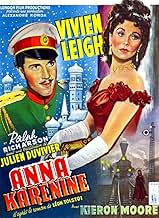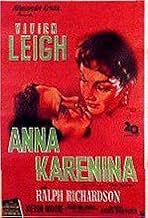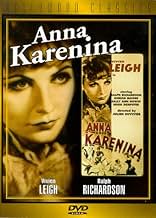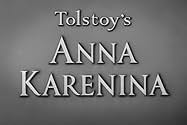IMDb-BEWERTUNG
6,6/10
3092
IHRE BEWERTUNG
Füge eine Handlung in deiner Sprache hinzuA married woman's affair with a dashing young officer has tragic results.A married woman's affair with a dashing young officer has tragic results.A married woman's affair with a dashing young officer has tragic results.
Niall MacGinnis
- Levin
- (as Niall Macginnis)
Empfohlene Bewertungen
There is very little to find fault with in this screen update of Tolstoy's classic story. Vivien Leigh is near perfection as the main character. What makes this film work is the way our tragic heroine is shown in relation to the elements that surround her: the scenes of train journeys in winter to and from Russia; and the warm weather and grandeur of a summer spent in Venice.
The supporting players are very effective and match Miss Leigh's talents in the most important scenes. The moment where Anna breaks in to see her son who has been told she died should not be missed. But the single greatest aspect of this film is the inner journey this character takes, as envisioned by Tolstoy. It is a harrowing confrontation of one's fate and delivered bravely as only this classic actress can.
The supporting players are very effective and match Miss Leigh's talents in the most important scenes. The moment where Anna breaks in to see her son who has been told she died should not be missed. But the single greatest aspect of this film is the inner journey this character takes, as envisioned by Tolstoy. It is a harrowing confrontation of one's fate and delivered bravely as only this classic actress can.
While certainly the vanities and indiscretions of upper crust Russia is examined by Tolstoy and it has been some time since I have read the lengthy novel, this version is certainly more memorable and effective than the Garbo version. I do agree with an earlier review in that Garbo herself, perhaps a bit too self-possessed and headstrong, could never represent the character of Anna, a woman carried away on passion, lust and impending tragedy.
Vivien Leigh is stunning in her facial expressions and vulnerable, almost exotic appearance, as we see her in a black gown, contrasted dramatically with other women who blend in the background to obscurity. The gowns and architecture of the era, the stark coldness and added texture of snowflakes, as a bas-relief to the portrait of Anna. Her close-ups particularly as she is in the train station in winter, foreshadowing her eventual fate.
Overall a beautiful film which is well worth viewing. Leigh is beautiful and tragic. 8/10.
Vivien Leigh is stunning in her facial expressions and vulnerable, almost exotic appearance, as we see her in a black gown, contrasted dramatically with other women who blend in the background to obscurity. The gowns and architecture of the era, the stark coldness and added texture of snowflakes, as a bas-relief to the portrait of Anna. Her close-ups particularly as she is in the train station in winter, foreshadowing her eventual fate.
Overall a beautiful film which is well worth viewing. Leigh is beautiful and tragic. 8/10.
Rumor had it that Vivien Leigh was not anxious to take on the remake of "Anna Karenina" partly because she had just recovered from tuberculosis, and maybe also because the ghost of Greta Garbo was too real. But she had one film left to do for Alexander Korda, and this was it. "Anna Karenina" released in 1948, stars Leigh as the tragic Anna. The story is based on Tolstoy's novel. Anna meets a handsome colonel, Count Vronsky (Kieron Moore) and falls in love with him. The trouble is, she is married to a high-level Russian bureaucrat (Ralph Richardson) and has a son. Anna's husband is a self-absorbed politician type, somewhat cold and aloof, consumed with his image in Russian politics. He sees marriage as a "duty" something he says a few times. Anna runs away with Vronksy, a horrendous scandal at the time and probably still would be today. It all ends tragically. Comparisons between this film and the 1935 one are inevitable. While both films are respectable, I prefer Viven Leigh's performance of Anna. Perhaps it was because Leigh had her own personal demons that she made this part so amazingly real, as she would in "A Streetcar named Desire" three years later. While I admire Garbo, I did not think of her as a great actress. Too aloof in some ways to believe she would fall head over heels for Vronsky. Ralph Richardson plays his part with consummate discipline; he can only see Anna's betrayal in terms of how it effects him. Kieron Moore is harder to judge. In the first part of the movie, he isn't given much to do except show off his good looks. He does, however, get a few good scenes as the movie progresses, and plays Vronksy as a decent man but also a flawed one. If you only know the 1935 version of this film, at least be open-minded enough to give this remake a chance. For me, Viven Leigh was reason enough for me to see it.
How can one possibly turn Tolstoy's novel into a "short" film? Even at 139 minutes in the uncut Korda version so much must be lost. What we end up, sad to say, is a first-rate melodrama without the psychological subtleties of the book. But that's the bad news. On the plus side, we have the sort of lavish the sky's-the-limit big, big, bigger budget production that only the Hungarian Alex Korda could have produced a few years after the world war on the sound stages of London --sets by the Russian Andreiev, costumes by the English Cecil Beaton; deep-focus photography and lighting by the French Henri Alekan ("Belle et Bete"), and music by the English composer Constant Lambert. Technically, this film contains some of the best B&W work ever done in Britian. Perhaps the greatest fault of the film is in the style of the acting. Vivian Leigh is a great beauty, very aristocratic, very British in her reserve, but when she falls in love with Vronsky she seems constitutionally incapable of the unbridled passion that Garbo brings to the role. Ralph Richardson, however, is perfect --far superior to Basil Rathbone. Richardson displays all the rigidity of Anna's husband; his enormous pride and wounded vanity; his total incapacity to understand his wife's heart. Needless to say, Kieron Moore as Vronsky tries very hard, looks wonderful in costumes, but he seems more a West-End juvenile than the great aristocrat and officer that Tolstoy depicts. Laurence Olivier would have been a perfect Vronsky. Why Korda chose not to cast him beside his wife is a mystery.
Count Tolstoy's massive novels, "War and Peace," and "Anna Karenina" are personally quite challenging.
Here are breathtakingly crafted literary works in a spiritual context of unconstructive energy. It's quite easy to become as entranced within these "worlds" as are many music lovers within the skewed terrain of Wagner's Valhalla and Nibelungens.
Tolstoy's words pull in the reader almost hypnotically as he spins his titanic, subtle tales of societal mores conflicting with human emotions.
Many of his characters are self-absorbed and vain, and his social environments repressive and stolid, with false values that tragically dehumanize and destroy.
So it's an ultimate challenge to attempt to separate these energetic downers from their dazzling technical counterparts.
In the case of "Anna," after stripping away the polished veneer, I find characters trying to cope with their testy emotional choices while being thwarted by inhuman societal standards.
Yet "Anna" is a favorite of filmmakers, having been done countless times, with the Garbo-Selznick version the most notable. Here Vivien Leigh gives a creditable performance of this distraught heroine, with Director Julien Duvivier joining Jean Anuith in script adaptation.
Ralph Richardson and Kieron Moore are both completely substantial, and general production values are attended to with solid professionalism.
Alas, the enactment seldom tugs heartstrings and, in fact, a strangely turgid pall seems to hang over the entire production. Condensing a 900-page novel down to 2-hour running time doesn't help matters.
As for Leigh, my feeling is that she gravitated too often to "fallen woman" roles. While she portrayed them very well, they may have failed to bring her the uplift her personality seemed to desperately seek. Hers was pretty much a career of depressingly joyless female characters, which perhaps worked not to her personal advantage.
That's another matter, though; Leigh was forever the consummate, fine actress, and her legacy is one of great artistic achievement.
This version of "Anna Karenina" remains a thoughtful, worthy attempt at a near-impossible task.
Here are breathtakingly crafted literary works in a spiritual context of unconstructive energy. It's quite easy to become as entranced within these "worlds" as are many music lovers within the skewed terrain of Wagner's Valhalla and Nibelungens.
Tolstoy's words pull in the reader almost hypnotically as he spins his titanic, subtle tales of societal mores conflicting with human emotions.
Many of his characters are self-absorbed and vain, and his social environments repressive and stolid, with false values that tragically dehumanize and destroy.
So it's an ultimate challenge to attempt to separate these energetic downers from their dazzling technical counterparts.
In the case of "Anna," after stripping away the polished veneer, I find characters trying to cope with their testy emotional choices while being thwarted by inhuman societal standards.
Yet "Anna" is a favorite of filmmakers, having been done countless times, with the Garbo-Selznick version the most notable. Here Vivien Leigh gives a creditable performance of this distraught heroine, with Director Julien Duvivier joining Jean Anuith in script adaptation.
Ralph Richardson and Kieron Moore are both completely substantial, and general production values are attended to with solid professionalism.
Alas, the enactment seldom tugs heartstrings and, in fact, a strangely turgid pall seems to hang over the entire production. Condensing a 900-page novel down to 2-hour running time doesn't help matters.
As for Leigh, my feeling is that she gravitated too often to "fallen woman" roles. While she portrayed them very well, they may have failed to bring her the uplift her personality seemed to desperately seek. Hers was pretty much a career of depressingly joyless female characters, which perhaps worked not to her personal advantage.
That's another matter, though; Leigh was forever the consummate, fine actress, and her legacy is one of great artistic achievement.
This version of "Anna Karenina" remains a thoughtful, worthy attempt at a near-impossible task.
Wusstest du schon
- WissenswertesVivien Leigh's costumes were made in Paris by Barbara Karinska to Cecil Beaton's designs. She was in such pain wearing them that she even went to her doctor fearing she had broken her ribs. It was subsequently discovered that the dresser had been putting the corsets on upside down.
- Zitate
Anna Karenina: My dear Korsunsky, you know very well I never dance unless I can help it.
- Crazy CreditsClosing credits: "And the light by which she had been reading the book of life, blazed up suddenly, illuminating those pages that had been dark, then flickered, grew dim, and went out forever".
- Alternative VersionenU.S. release version runs approximately 112 minutes. This is the version issued by Fox DVD in 2007.
- VerbindungenFeatured in Vivien Leigh: Scarlett and Beyond (1990)
Top-Auswahl
Melde dich zum Bewerten an und greife auf die Watchlist für personalisierte Empfehlungen zu.
Details
- Erscheinungsdatum
- Herkunftsland
- Offizieller Standort
- Sprachen
- Auch bekannt als
- Alexander Korda's Production of Tolstoy's Anna Karenina
- Drehorte
- Monterey, Kalifornien, USA(racetrack and steeplechase scenes)
- Produktionsfirma
- Weitere beteiligte Unternehmen bei IMDbPro anzeigen
Box Office
- Budget
- 2.000.000 $ (geschätzt)
- Laufzeit1 Stunde 45 Minuten
- Farbe
- Seitenverhältnis
- 1.37 : 1
Zu dieser Seite beitragen
Bearbeitung vorschlagen oder fehlenden Inhalt hinzufügen




































